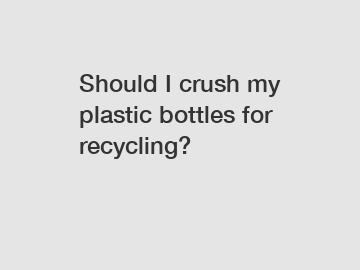Dec. 18, 2023
Machinery
Recycling has become an essential practice for conserving resources and reducing waste. As responsible citizens, many of us diligently separate our recyclables, but the question of whether to crush plastic bottles before recycling often leaves us undecided. In this blog, we will explore the benefits and considerations of crushing plastic bottles, ultimately helping you make an informed decision regarding their recycling. Let's dive in!
The Pros of Crushing Plastic Bottles.
1. Efficient Space Utilization:

Crushing plastic bottles can significantly reduce the space they occupy in recycling bins, helping to optimize collection and transportation efficiency. By compressing empty bottles, we can make room for more recyclables, reducing the volume required for recycling facilities and cutting down on carbon emissions associated with transportation.
2. Reduced Plastic Pollution:
Crushed plastic bottles are less likely to escape during collection and processing, preventing potential littering and environmental pollution. Encased tightly in bins, they pose less risk of being carried by wind or scattered by animals, reducing the chances of bottles ending up in rivers, oceans, or natural habitats.
3. Enhanced Handling and Sorting:
Crushed bottles are easier for recycling facilities to handle and sort. Compact and stackable, they occupy less space on conveyor belts, allowing for smoother processing machinery operation. This leads to increased accuracy during sorting, ultimately improving recycling rates and the quality of recycled materials.
The Drawbacks and Considerations.
1. Air Pockets:
When plastic bottles are crushed, small air pockets can be created within them. These air pockets can potentially disrupt efficient sorting in recycling facilities, as they may affect the accuracy of sensors used to separate different plastics. Consequently, crushed bottles may be mislabeled or wrongly categorized, resulting in lower overall recycling efficiency.
2. Contamination Risk:
While crushing bottles might seem harmless, it can increase the risk of contamination if not done correctly. Crushed bottles might retain liquid residue or food particles, which can spoil an entire load of recyclables during processing. Properly rinsing bottles before crushing and ensuring they are completely dry can mitigate these risks.
Conclusion: The Choice is Yours.
Considering the pros and cons, the decision of whether to crush plastic bottles rests in your hands. Here are a few final points to consider:
1. Regulations and guidelines:
Check with your local recycling facility to understand and adhere to specific guidelines regarding bottle crushing. Regulations may vary, so it's essential to stay informed to ensure your recycling practices align with their requirements.
2. Convenience and storage:
If your recycling bins frequently overflow, crushing plastic bottles might be a practical solution for optimizing space utilization. However, if you have ample storage capacity for uncrushed bottles, or your community provides frequent recycling pickups, it may not be necessary.
3. Personal responsibility:
Regardless of whether you crush your plastic bottles or not, your decision to recycle them is crucial. Properly rinsing and correctly sorting your recyclables should take precedence over bottle crushing. Remember that recycling is just one part of a broader effort to reduce waste – reducing consumption and reusing bottles should also stay front of mind.
4. Alternative solutions:
Consider alternative ways to reduce plastic waste by opting for reusable bottles or containers whenever possible. By consciously minimizing our reliance on single-use plastics, we can significantly contribute to the overall reduction of plastic waste in our environment.
Ultimately, our collective commitment to recycling and sustainable choices is what will make the most significant impact. By understanding the benefits and drawbacks of crushing plastic bottles for recycling, you can tailor your actions to align with your local guidelines and personal circumstances.
So, should you crush your plastic bottles for recycling? The choice depends on your individual situation. Remember, every effort counts.
Let's aim for a cleaner, greener future through responsible recycling practices!
[ By inserting your final thoughts/handle here, you can engage with readers and build trust further. ].
Want more information on plastic bottle shredder, plastic crusher for pvc material, Bale Ppener Machine Manufacturer? Feel free to contact us.
Previous: Can ozone generators revolutionize sustainable irrigation?
Next: Decoding Gear Shaping vs Gear Hobbing: Unveiling Differences
If you are interested in sending in a Guest Blogger Submission,welcome to write for us!
All Comments ( 0 )